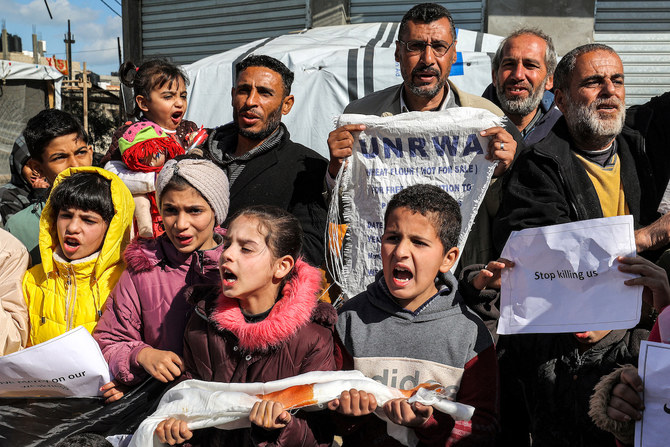
- ARAB NEWS
- 06 Jul 2025

LONDON: The humanitarian catastrophe which is affecting more than 2 million people in Gaza is at risk of further deterioration following the withdrawal of financial support by 16 donor countries to the UN Relief and Works Agency for Palestine Refugees in the Near East, the organization said on Thursday.
Israel’s bombardment and escalating military operations in Khan Younis have forced tens of thousands of Palestinians to flee to southern Gaza, exacerbating overcrowding in the Rafah Governorate, where more than 1.4 million are already struggling for survival.
Most displaced individuals are sheltering in temporary structures, tents, or in the open, fearing the loss of vital food and aid from UNRWA.
“Rafah has become a sea of people fleeing bombardments,” Thomas White, director of UNRWA affairs in Gaza, said.
Most of those fleeing Khan Younis have already been displaced several times, and many have been forced to leave Khan Younis Training Centre, the largest UNRWA shelter.
UNRWA staff, who are themselves among the displaced, continue to deliver food and tents to those newly displaced around them.
The reliance on UNRWA in the Gaza Strip for fundamental needs such as shelter, food, and healthcare is paramount, especially among its residents, most of whom are women and children.
Humanitarian conditions have deteriorated as the war has continued, and humanitarian access remains largely restricted due to Israel’s siege of the strip.
UNRWA has had limited access to the north, where famine is looming, since the beginning of the war.
White said: “UNRWA received reports that people in the area are grinding bird feed to make flour. We continue to coordinate with the Israeli army to be able to go to the north, but this has been largely denied.
“When our convoys are finally permitted to go to the area, people rush to the trucks to get food and often eat it on the spot.”
UNRWA, the largest humanitarian organization in Gaza, employs around 13,000 staff, of which more than 3,000 remain actively involved in the agency’s humanitarian efforts despite the challenging conditions.
White added: “It’s difficult to imagine that Gazans will survive this crisis without UNRWA.”
Several nations, including Austria, Australia, Canada, Finland, Germany, Italy, Japan, and the UK, have followed the lead of the US in suspending funding to the agency.